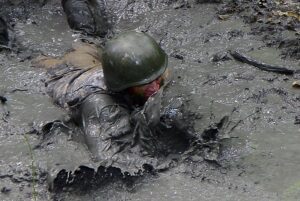The Undefiled Tabernacle
“Then (the High Priest) shall slaughter the goat of the sin offering, which is for the people, and bring its blood inside the veil … and sprinkle it on the Mercy Seat. He shall make atonement for the Holy Place, because of the impurities of the sons of Israel and because of their unlawful acts regarding all their sins; and he shall do so for the tent of meeting which remains with them in the midst of their impurities” (Leviticus 16:15-16)

Aaron the High Priest had many tasks to perform on this day – the Great Day of Atonement or Yom Kippur. Aaron replaced his majestic priestly raiment and gold crown for humble white linen garments. This foreshadowed Jesus’ own incarnation and humiliation. Jesus set aside the prerogatives of Deity and assumed the humble role of a servant (Philippians 2:5-11). He did so that He might serve as both our Great High Priest and God’s ultimate sacrifice for sin (Hebrew 5:1-10; 9:11-14, 24-26).
Then Aaron made his first trip behind the veil into the Holy of Holies to burn incense before the Mercy Seat (or, Atonement Cover). This of course pictures the intercession of our great High Priest, Jesus Christ, who intercedes with God on our behalf (Hebrews 7:25).
On his second entrance into the Holy of Holies, Aaron brought the blood of a bull and sprinkled it seven times upon the Mercy Seat. This was to make atonement for his own sins – something Jesus the Righteous One, never had to do (Hebrews 7:26-28).
Then, the High Priest Aaron made a third venture into the Holy of Holies. This time he sprinkled the blood of a goat on the Mercy Seat of the Ark on behalf of Israel – to make atonement for their sins. The symbolism here is great. Beneath the Mercy Seat were the tablets of the Ten Commandments which Israel had violated, requiring God’s judgment. But above the broken law was the atoning blood upon the Mercy Seat and the cloud of incense, picturing the priest’s intercession. Therefore, both the atoning blood and the priest’s intercession came between God’s violated law and the consuming fire of God’s presence.
On a far greater scale the precious blood of the Lamb of God saves us from God’s wrath for breaking His law and He unceasingly intercedes for us, pleading our pardon in heaven (Romans 8:34; 1 John 2:1-2).
But while making atonement for the people, Aaron was commanded to perform another task. He was to make atonement for the structure of the Tabernacle itself – the Holy of Holies, the Holy Place, and the entire court with all its sacred furnishings.
Why was this necessary? Wasn’t the Tabernacle God’s dwelling place on earth (Exodus 25:8)? Wasn’t His presence enough to keep it sanctified and pure? Yet, God explains, the Tabernacle became soiled simply by its close proximity to Israel. Yes, Israel’s constant rebellion and hardheartedness were having a soiling effect on the Tabernacle (Leviticus 15:31). Therefore, it needed cleansing.
There’s a lesson here for God’s people today. For the New Testament teaches that believers in Jesus Christ constitute God’s dwelling place on earth (1 Corinthians 3:16-17; 6:19-20; 2 Corinthians 6:16-18; Ephesians 2:19-22). God no longer dwells in temples made by the hands of men (Acts 7:48-50). He dwells within the hearts of His blood-washed people – individually and corporately. This was demonstrated on the Day of Pentecost when the same divine manifestation of fire, which once hovered above the Tabernacle, now hovered over Jesus’ disciples (Acts 2:2-3).

Yet, because of their continual interaction with the world and the relentless barrage of temptations and godless thoughts which plague them, God’s people require daily cleansing. Jesus explained this when He washed the disciples’ feet. He explained, “Those who have had a bath (i.e. whose sins have been cleansed by faith) need only to wash their feet (from being soiled by the walking through this sinful world). Their whole body is clean” (John 13:10).
In other words, the Christian believer does not fall from grace with every little sin they commit. When he or she puts their faith in Christ, they plug into His atonement which has forever satisfied God’s justice and put away all sin – past, present and future.
But, in our day to day living, the wicked thoughts and feelings which continually bombard us have their defiling effect. And we need daily cleansing. Fortunately, the atoning blood of Christ keeps on cleansing us from sin (1 John 1:7). Compare it to the way your car’s wipers keep on erasing the raindrops that keep splattering your windshield. And the Holy Spirit who indwells us – the tabernacle of God – renews our hearts each and every day (2 Corinthians 4:16).
But there is one tabernacle which never requires cleansing. This tabernacle is the Lord Jesus Christ Himself. In the Gospel of John Christ is revealed as the eternal Word who dwelt with the Father for all eternity and who also created the universe (John 1.1-3). Then we are told that this eternal Word “became flesh and tabernacled (Greek skeno’o) among us and we beheld His glory” (John 1:14). In Jesus dwells all the fullness of Deity in bodily form (Colossians 2:9). And this role of Jesus as God’s ultimate Tabernacle will extend into eternity (Revelation 21:22).
Yet Jesus never required any cleansing as the Old Testament Tabernacle did – despite His nearness to humanity. For He was Jesus Christ the Righteous One (1 John 2:2), who knew no sin (2 Corinthians 5:21), even though He was tempted in every way as we are (Hebrews 4:15).
Though humanity’s sin must have been a constant irritant to Him, Jesus was never defiled by it. On the contrary, it was impossible for any human defilement to overcome Jesus. For when the leper came to Christ and said, “Lord, if You are willing You can make me clean,” Jesus did not merely speak the words to him, “Be cleansed!” No, Jesus touched the leper – something that should have defiled Him (Leviticus 13:45-46). But Jesus is God in the flesh. And instead of becoming defiled by the leper’s touch, it is the leper who is healed and cleansed by the touch of Jesus (Matthew 8:1-4).
In the same way, when the woman with the hemorrhage of blood touched the hem of Jesus’ garment, it should have defiled Him according to the law (Leviticus 15:1-33). But instead of becoming defiled, power and cleansing flowed forth from Him to cleanse and heal the woman (Mark 5:25-34).

Jesus is infinitely greater than all our sin and defilement. That’s why Jesus could rub shoulders with sinners without threat or harm to Himself. Rather, His contact always healed and cleansed sinners. We may be frail and vulnerable to sin and Satan’s snares. We may always be on the verge of tottering, but never Jesus. He is the Rock of Eternity to which we must cling at all times for strength, grace, and salvation (Isaiah 26:4).
PRAYER: Lord Jesus, to You I cling as my unfailing source of forgiveness, cleansing, strength, protection, provision, and eternal salvation. Please teach me, O Lord, to trust less in myself and more in You. Amen.







